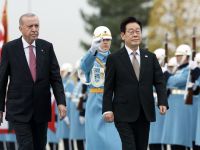US B-52s intensified the carpet bombing of frontline positions in the north Thursday as the Taliban claimed Afghanistan's biggest power station had been severely damaged and a major dam in the barren south of the drought-stricken country put at risk.
The Kajaki hydro-electric power station in Helmand province was bombed Wednesday afternoon and electricity supplies to the cities of Kandahar and Lashkarga were completely cut.
Taliban Education Minister Amir Khan Muttaqi warned any further bombing would destroy the dam on which the power plant, 90 kilometres (55 miles) northwest of Kandahar, depends.
"So far water has not started gushing out of the dam but any further bombing will destroy the dam. It may cause widespread flooding putting at risk the lives of thousands of people," Muttaqi was quoted as saying.
The dam containes 2,700 million cubic metres of water, produces 150,000 kilowatts of electricity per hour and irrigates land farmed by 75,000 families with more than 50,000 cattle, he said.
"America wants to destroy everything in Afghanistan. There are no military installations in Kajaki, not even in the district," the minister said.
No independent confirmation of the destruction was possible but residents of Kandahar, the Taliban's southern nerve centre, have reported constant power outages since the airstrikes began on October 7.
Stratofortress B-52 bombers dropped their thunderous payloads on Taliban positions close to the border with Tajikistan for more than four hours from 4:00 am (2330 GMT Wednesday) Thursday morning, reporters in the region said.
The ground shook and windows shattered in the opposition-held town of Khwaja Bahauddin, some 25 kilometres from the Taliban's forward positions.
The Taliban said fighting also raged on the ground with the US-backed opposition in the northern Dara-e-Souf valley, 70 kilometers south of the strategic Taliban-held town of Mazar-i-Sharif.
The chairman of the militia's Bakhter information agency, Qari Fazal Rabi, said the opposition Northern Alliance launched an infantry assault Wednesday evening, aiming to over-run Taliban hilltops which had been bombed by US jets in the afternoon.
"The opposition launched an offensive but it was repulsed and the frontlines remain unchanged," he said. "The Americans bombed the frontlines there as well."
But an opposition spokesman denied any attack was made.
"The Taliban report is a complete lie. America continues to bomb them and we're waiting for the right time to attack," spokesman Mohammad Ashraf Nadeem told AFP from the northern province of Samangan province.
The conflicting claims about the battle for Mazar-i-Sharif could not be verified, but the Taliban have stood firm despite a series of opposition attacks in the area since the US-led airstrikes began on October 7.
Mazar-i-Sharif has a key airport and forms the junction of supply and communications routes linking northern provinces as well as Uzbekistan over the border to the north, where more than 1,000 US troops are stationed.
The militia now says the death toll from more than three weeks of bombing has risen to 1,500 civilians, 500 more than previously claimed. The figures have been dismissed as propaganda by US defence officials.
The United Nations believes up to 130,000 Afghan refugees have fled into Pakistan since the terror attacks on the United States in September, up from previous estimates of 80,000.
Millions more are dependent on foreign food aid inside the desperately poor country, which has been ravaged by more than 20 years of war and three years of drought.
Taliban Foreign Minister Wakil Ahmed Mutawakel insisted the leadership would not buckle under the military assault as he made a rare appearance in front of foreign reporters in Kandahar late Wednesday.
The foreign minister, who has been at the centre of rumours that he wanted to break away from the hardline Islamic movement, said: "There is no split in the Taliban. This is the claim of our opponents.
"The time for talks with the United States is over," he added. "They want a military solution and they have closed the door on negotiation."
US officials insisted the bombing had crippled Taliban command structures.
"I can say that their command and control has been cut, severely degraded," Rear Admiral John Stufflebeem, deputy director of operations of the US Defence Department's Joint Staff, said in Washington. "They are having extreme difficulty communicating one to the other" -- KABUL, (AFP)
© 2001 Al Bawaba (www.albawaba.com)







